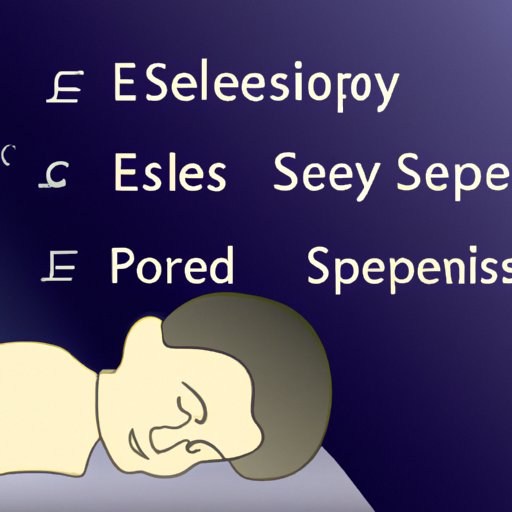
Introduction
Seizures are a common medical condition that affects millions of people worldwide. The thought of experiencing a seizure during sleep and not waking up can be terrifying, and it’s essential to understand the risks associated with this situation. For those who have encountered this problem, knowing the probability of dying from a seizure during sleep is critical in managing this condition effectively.
Understanding the Risk: Can You Die from a Seizure in Your Sleep?
Seizures can happen anytime and anywhere, and whether you’re awake or asleep, it can occur. However, the risk of dying from seizures during sleep is higher due to the potential of an unobserved seizure. During a seizure, people usually experience abnormal and intense electrical activity in their brains, which can last from seconds to minutes. Seizures might have various causes, but people with epilepsy or other seizure conditions are at a higher risk of experiencing them during sleep than those without it.
The Science Behind Seizures and Sleep-Related Deaths
Several factors can increase the likelihood of seizures during sleep, including the natural cycle of the human brain, which can affect the brain’s response to seizures. During sleep, the brainwaves become slow, and the activity in certain parts of the brain reduces. This decrease in activity makes it more likely for seizure activity to spread and become more intense, leading to a higher risk of sudden death. The risk of sudden death is highest during stages 3 and 4 of NREM (Non- Rapid Eye Movement) sleep, which occurs in the first half of the night.
Sleep Seizures: What You Need to Know to Stay Safe
People with epilepsy or other seizure disorders need to take some precautions to stay safe during sleep. One of the essential things to do is to work with their medical provider to develop a seizure management plan that includes appropriate medications, regular check-ups, and alerting family members and friends of the condition. Individuals also need to avoid indulging in activities that can trigger seizures, such as drinking caffeine or alcohol before sleep, overtiring the body, or not getting enough sleep. Having an alert system in place is also essential to ensure that people can get quick help if a seizure happens while they sleep.
Exploring the Causes of Fatal Seizures During Sleep
Seizures can be caused by various reasons, including underlying medical conditions such as brain tumors, strokes, infections, or chemical imbalances within the body. A person’s lifestyle can also play a significant role, such as excessive alcohol intake, high-stress levels, sleep deprivation, or exposure to flashing lights. In some cases or worsening medical conditions, a person may also develop sudden, unexpected seizures during sleep or after waking up, leading to a higher risk of sudden death.
The Mortality Risk of Sleep Seizures: What Experts Say
Studies into sudden, unexpected death in epilepsy (SUDEP) have shown that the risk of sudden death increases for people with epilepsy who have had seizures during sleep or waking up. However, the exact risk is still unknown. According to medical professionals, the risk of death from seizures can be reduced by seeking proper medical assistance, taking prescribed medications as directed, and following a generally healthy lifestyle. It’s important to discuss the risks with a medical professional to manage the condition effectively and reduce risks.
Living with Epilepsy: Managing Your Risk of Sudden Death
For individuals living with epilepsy, managing their risk of sudden death requires a combination of strategies, including taking the appropriate medication, getting enough sleep, avoiding high-stress environments, and maintaining a generally healthy lifestyle. They also need to get regular checkups to monitor any changes in the epilepsy condition and be vigilant about any changes related to the epilepsy, regardless of whether they occur during sleep or not. Close support from family and friends, as well as alert systems such as seizure response dogs, can also offer extra layers of protection for people with epilepsy.
Conclusion
It’s essential to understand the risks associated with seizures and sleep-related death, especially for individuals with epilepsy or other seizure disorders. By knowing and taking the necessary precautions, individuals can reduce the risk of sudden death and ensure they stay safe while sleeping. By following the guidelines prescribed by medical professionals, an individual can take control of their overall health and well-being and avoid the risks associated with seizures during sleep.




